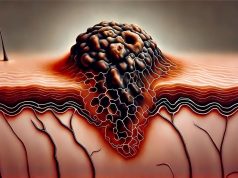Findings support observational epidemiology showing protective effect of dog exposure early in life
By Elana Gotkine HealthDay Reporter
MONDAY, June 9, 2025 (HealthDay News) — Early-life dog exposure may modify the genetic effect of the single nucleotide variant rs10214237 on atopic eczema (AE) via IL7R, according to a study published online June 4 in Allergy.
Marie Standl, Ph.D., from the Helmholtz Zentrum München–German Research Center for Environmental Health in Neuherberg, Germany, and colleagues examined gene-environment interactions to examine the pathophysiology of AE. Interaction was tested between the 24 most significant AE-associated loci identified from genome-wide association studies and 18 early-life environmental factors using data from 16 European studies. A further 10 studies and in vitro modeling were used to independently assess findings.
The researchers found that the discovery analysis (25,339 individuals) showed suggestive evidence for interaction between seven environmental factors and at least one established single nucleotide variant (SNV) for AE, with a total of 14 interactions. In the replication analysis, with 254,532 individuals, there was a nominally significant interaction for dog exposure with the SNV rs10214237 (on chromosome 5p13.2 near IL7R), with odds ratiointeraction = 0.91; the risk effect of the T allele was only seen for those not exposed to dogs. For siblings in the discovery analysis, a similar interaction with rs10214237 was observed (odds ratiointeraction = 0.84), but a replication analysis was underpowered. Lower IL-7R expression was seen in human keratinocytes in association with the rs10214237 homozygous risk genotype, and a differential response was seen according to the rs10214237 genotype for dog exposure modeled in vitro.
“More work is needed, but our findings mean we have a chance to intervene in the risk of allergic disease, to protect future generations,” coauthor Sara J. Brown, M.D., Ph.D., from the University of Edinburgh, said in a statement.
Several authors disclosed ties to the pharmaceutical industry.
Copyright © 2025 HealthDay. All rights reserved.








